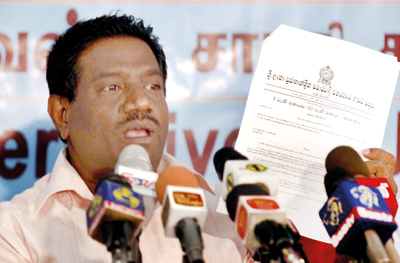News
A method in the madness to rein in the ‘tuk-tuk’s
Three-wheeler drivers charge that, despite the new regulations for the operation of three-wheelers, absence of a State body to monitor and support three-wheeler drivers, will, for all intents and purposes, result in the regulations being observed in the breach.
All-Island Three-Wheel Drivers and Owners Union President Sudhil Jayaruk said most people sought three-wheelers as the public transport system is a failure.

All-Island Three-Wheel Drivers and Owners Union President Sudhil Jayaruk addressing the media. Pix by M.A. Pushpa Kumara
“Though standing passengers should be 15% of the total load, buses are overloaded. Though buses are monitored under the National Transport Commission, these rules are not adhered to,” he said, adding that the absence of a statutory body to monitor will end up with three-wheeler drivers disobeying rules.
D.G.C. Weerasinghe(64) from Pannipitiya has been a three-wheeler driver since 1990. A former government sector employee, Weerasinghe said he is opposed to the implementation of the regulations until a body is established to listen to their grievances.
According to him, a three-wheeler driver has to bear mounting expenses. A clutch/gear or brake cable costs Rs 650 and a service charge has gone up from Rs 700 to Rs 3,000. Most three-wheeler drivers pay a lease ranging from Rs 8,200 to Rs 15,000 per month.
“Today, my collection was only Rs 100, while the fuel cost was Rs 350. The Government should also provide more relief for three-wheelers. We are providing a service, which the public transport service has failed to do,” he added.
Mr. Weerasinghe added that, installing a meter costs Rs 11,500, while its repairs cost Rs 2,500. “A few meters were distributed at a provincial level, through political influence,” he said.
Samantha Peiris (40), a three-wheeler driver from Colombo stated that it is unreasonable to appoint a committee comprising secretaries of ministries and heads of departments, with no representation from the three-wheeler community. “Three-wheeler drivers are not only those attached to call-centre operating three-wheeler service companies, but also those living and operating in police areas as well,” he said.
He charged that there is an increase in three-wheeler drivers coming from the outstation into Colombo, thereby increasing the number of three-wheelers within Colombo, and most of these drivers are ignorant of the road network. “These three-wheeler drivers are attached to service companies. It is noteworthy that the regulations mention that passengers should be taken to their destinations by the shortest possible route. The requirement to display the name and other details is needed, especially for three-wheelers driven by outsiders,” he added.
He said if a monitoring body is introduced, all three-wheeler drivers will follow the regulations. All-Island Three-Wheel Drivers’ Union President Lalith Dharmasekera said about 600,000 three-wheelers transport passengers around the country, with the majority from Colombo.
“About three million persons, directly and indirectly benefit from the income from three-wheeler operations. Unfortunately, there is no monitoring body,” he said. The ‘Motor Traffic (Motor Tricycle) Regulations of 2013’ came into effect from July 31 this year.
Among the rules are the behaviour of the driver, display of registration number, driver’s name along with his photograph, driving licence number and contact number, on the back of the driver’s seat.
It is also important to instal and maintain two exterior rear view mirrors in good condition, tail or stop lamp, head lamps with head and dip beams and an indicator, side direction indicator lamp, reverse lamp, parking lamps and horns, two interior lamps for driver compartment and passenger compartment.
The regulation does not permit any kind of lettering on the front and rear of the three-wheeler, with only the fare displayed.
The maximum number of passengers is compulsorily and restricted to three adults or two adults and two children under 12 years.
All three-wheelers used for passenger transport should have a standardised meter tested by the Registrar of Motor Vehicles. Meters should also be tested annually. The driver should also issue a receipt at the end of the journey.
The regulation states that articles left behind by a passenger, should be handed over to the nearest police station and a written acknowledgement of receipt obtained from the officer-in-charge at the station. Establishing a Fare Review Committee headed by the Transport Ministry Secretary, to introduce a price formula, is also stated in the newly introduced regulation.
Motor Traffic Commissioner S.H. Harischandra said that there is confusion with regard to a regulatory body, as three-wheelers come under private passenger transport. “We are in the process of discussing this matter. The gazette will be first presented to Parliament,” he added.
Police Spokesman Buddhika Siriwardena said that Traffic Police is an implementing body and cannot take any measures until confirmation is received to act according to the regulations.
Follow @timesonlinelk
comments powered by Disqus

